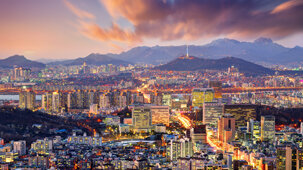Best Oil, Gas & Energy Lawyers in Seoul
Share your needs with us, get contacted by law firms.
Free. Takes 2 min.
List of the best lawyers in Seoul, South Korea
About Oil, Gas & Energy Law in Seoul, South Korea:
Oil, gas, and energy play a vital role in South Korea's economy, with Seoul being a major hub for energy-related activities. The legal framework surrounding these industries is complex and highly regulated to ensure safety, environmental protection, and fair competition. Understanding the laws governing oil, gas, and energy in Seoul is essential for businesses and individuals operating in this sector.
Why You May Need a Lawyer:
There are various situations where you may need a lawyer specializing in oil, gas, and energy law in Seoul. This could include negotiating contracts with energy companies, resolving disputes related to land use or environmental regulations, navigating complex regulatory requirements, or seeking legal recourse in case of accidents or breaches of contract. A lawyer can provide valuable guidance and representation to protect your interests and ensure compliance with the law.
Local Laws Overview:
In Seoul, South Korea, the legal framework governing oil, gas, and energy is primarily regulated by the Ministry of Trade, Industry, and Energy. Key aspects of local laws include environmental protection measures, licensing requirements for energy projects, tax regulations for the oil and gas industry, and regulations related to foreign investment in the energy sector. It is important to be aware of these laws and comply with them to avoid legal issues.
Frequently Asked Questions:
1. What are the key regulatory bodies overseeing the oil, gas, and energy industry in Seoul?
The Ministry of Trade, Industry, and Energy and the Korea National Oil Corporation are the primary regulatory bodies overseeing the industry in Seoul.
2. What are the environmental regulations related to oil, gas, and energy projects in Seoul?
Environmental impact assessments, waste management, and emissions regulations are key environmental regulations that companies need to comply with in Seoul.
3. How are mineral rights regulated in South Korea?
Mineral rights are typically owned by the government in South Korea, and companies need to obtain licenses or leases to explore and produce oil and gas.
4. What are the requirements for foreign investment in the energy sector in Seoul?
Foreign investors need to comply with specific regulations and may require government approval for investment in the energy sector in Seoul.
5. How are disputes in the oil, gas, and energy sector typically resolved in Seoul?
Disputes are often resolved through arbitration or litigation, depending on the nature of the dispute and the terms of the contract.
6. What are the tax implications for companies operating in the oil and gas industry in Seoul?
Companies operating in the industry may be subject to corporate income tax, value-added tax, and other specific taxes related to the sector.
7. How can a lawyer assist with oil, gas, and energy-related legal matters in Seoul?
A lawyer can provide legal advice, draft and review contracts, represent clients in negotiations and disputes, and ensure compliance with regulatory requirements.
8. What are the potential legal risks for companies operating in the oil, gas, and energy industry in Seoul?
Legal risks could include breaches of contract, non-compliance with regulations, environmental violations, and disputes with stakeholders.
9. How can companies ensure compliance with local laws and regulations in Seoul?
Companies should stay informed about the latest regulations, conduct regular audits, seek legal advice, and implement compliance programs to ensure adherence to the law.
10. What are the penalties for non-compliance with oil, gas, and energy laws in Seoul?
Penalties for non-compliance could include fines, license revocation, civil liability, and criminal sanctions, depending on the nature and severity of the violation.
Additional Resources:
For more information on oil, gas, and energy laws in Seoul, you can refer to the Ministry of Trade, Industry, and Energy website or consult with legal experts specializing in this field.
Next Steps:
If you require legal assistance related to oil, gas, and energy in Seoul, it is advisable to seek advice from experienced lawyers who are familiar with the local laws and regulations. They can provide tailored solutions to address your specific legal needs and ensure compliance with the law.
Lawzana helps you find the best lawyers and law firms in Seoul through a curated and pre-screened list of qualified legal professionals. Our platform offers rankings and detailed profiles of attorneys and law firms, allowing you to compare based on practice areas, including Oil, Gas & Energy, experience, and client feedback.
Each profile includes a description of the firm's areas of practice, client reviews, team members and partners, year of establishment, spoken languages, office locations, contact information, social media presence, and any published articles or resources. Most firms on our platform speak English and are experienced in both local and international legal matters.
Get a quote from top-rated law firms in Seoul, South Korea — quickly, securely, and without unnecessary hassle.
Disclaimer:
The information provided on this page is for general informational purposes only and does not constitute legal advice. While we strive to ensure the accuracy and relevance of the content, legal information may change over time, and interpretations of the law can vary. You should always consult with a qualified legal professional for advice specific to your situation.
We disclaim all liability for actions taken or not taken based on the content of this page. If you believe any information is incorrect or outdated, please contact us, and we will review and update it where appropriate.















